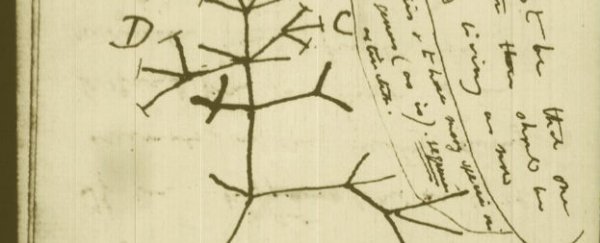This week, 155 years ago, Charles Darwin published a book that would change science forever - On the Origin of the Species. Over the past seven years, the American Museum of Natural History's (AMNH) Darwin Manuscripts Project has been digitising all of Darwin's original notes and musings on evolution so they can be freely distributed online.
Today, the manuscripts project reached the halfway mark by releasing over 16,000 high-resolution images of Darwin's research on evolution to the public. The AMNH says the documents released "cover the 25-year period in which Darwin became convinced of evolution; discovered natural selection; developed explanations of adaptation, speciation, and a branching tree of life; and wrote the Origin".
"Darwin's work in creating the Origin of Species encompassed much more than just setting pen to paper and writing the epochal book," Darwin Manuscripts Project Director David Kohn said in a press release. "The Origin was the mature fruit of a prolonged process of scientific exploration and creativity that began toward the end of his Beagle voyage, which first kindled Darwin's interest in evolution, and that continued to expand in range and deepen in conceptual rigour through numerous well-marked stages."
Robbie Gonzalez at io9 has already rifled through the treasures on offer to find drawings by Darwin's children, the first use of the term 'natural selection' in scientific literature, and a draft title page for Origin of Species (as it was originally called).
Something that's clear in the notes that have been released is how ready to improve on and correct himself Darwin was. As Becky Ferreira writes at Motherboard, "He clearly thrived on chucking out old ideas and hedging his bets with new ones, leaving plenty of breathing space for future generations to expand on his accumulated evidence. As he wrote to A. Stephen Wilson in 1879, 'to kill an error is as good a service as, and sometimes even better than, the establishing a new truth or fact'."
The rest of the 30,000 manuscripts will be digitised and released by June next year, which includes his extensive experimental research manuscripts written between 1835 and 1882.
You can access all the digitised manuscripts now at the Darwin Manuscripts Project site.
Think you've got the concept of evolution all figured out? Watch this TED-ed video below about common myths and misconceptions about evolution to see if you've mastered the finer details of Darwin's great theory:

Sources: io9, The Darwin Manuscripts Project, Motherboard
